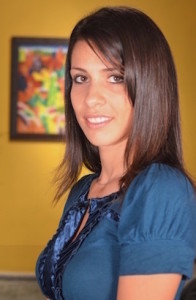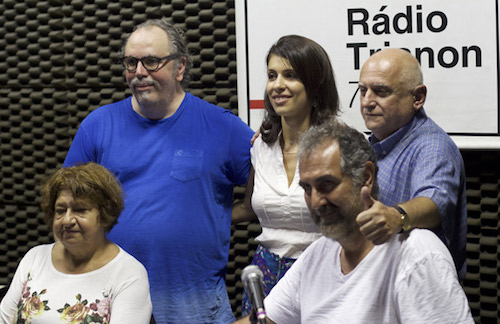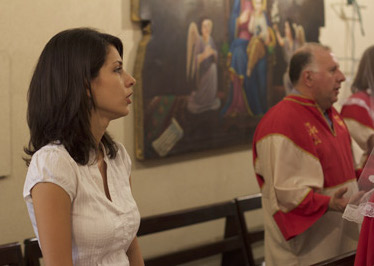Arpa Film Festival 2015 interviews with film directors
Isabella Bablumian is celebrating three major accomplishments. The first two, she refers to as “her babies.” One, is the birth of her daughter, Luiza Lilit; two, the completion of her documentary film, Armenia Sings on in Our Hearts; and three, the honor of receiving a 2015 Arpa International Film Festival Best Documentary nomination.
Bablumian, a native Armenian, has traveled extensively and connected with a variety of people throughout the world. Her desire to contribute to the centennial of the Armenian genocide lead her to do so through storytelling and creating her first documentary film. As a first time filmmaker, Bablumian took on the arduous task of writing, directing and producing her documentary.
Film summary
Armenia Sings on in Our Hearts is a a documentary that explores the diversity of the Armenian diaspora. This film spans several generations, explaining the history of the diaspora and proves that no matter how far from home they are, Armenia will always remain in their hearts. It’s a unique cultural journey and includes festive celebrations, the communities challenges, and how younger generations remain connected to the roots, while simultaneously redefining what it means to be Armenian. Armenians from France, USA, Argentina, Brazil, and Armenia are interviewed and pondered the question of what it means to be Armenian in the modern day.
About the Writer-Director-Producer
A native Armenian, Isabella Bablumian was born in Yerevan. After leaving her homeland in the aftermath of the fall of the Soviet Union, she has since lived in Russia, Spain, USA, and now resides in Brazil. This first time filmmaker has a background in international relations and project management. She has implemented numerous international development projects for the World Bank Group, U.S. Agency for International Development, among others and has served as a special adviser at international institutions and subnational governments. More recently she set up her own business as a consultant and business developer in Brazil.
Her passion for producing and directing sprang from the need to tell the story of her compatriots whom she met during her worldly travels. Inspired by them, Bablumian set out to portray how Armenians were able to uphold their identity and culture one hundred years after the genocide far away and cut off from their homeland.
Bablumian is also a singer, referring to singing as “a serious hobby.” She has won numerous competitions in classical performance, has been a guest performer at Armenian folk/traditional music festivals in the US and Brazil, and more recently recorded her first disk: the soundtrack for Armenia Sing on in Our Hearts.
The interview
Arpa International Film Festival will screen Armenia Sings on in Our Hearts at the Egyptian Theatre in Hollywood, on November 15, at 2 p.m. At the onset of our telephone interview, Bablumian warned me that she has a newborn and may have to stop the interview to tend to her daughter. Of course baby Luiza Lilit slept through the heart-warming interview, as I’m sure she is accustomed to hearing her mommie’s compassion and passion for the documentary.
Below is the interview Sharon Swainson, writer for Arpa Film Festival, had with Isabella Bablumian.
Why did you choose to make your film?
I was considering what would be the most meaningful way to commemorate the 100th Years of Remembrance of the Armenian Genocide, but I did not want to just focus on the genocide. I wanted to show how our people have moved beyond that and have preserved our culture. Show how our people were able to survive, preserve, maintain and evolve our culture into what it is now.
The second reason, I’m a very international person having lived in Russia, USA, Brazil, and worked in international relations. From the travels and living in different locations, I met many Armenians who saw themselves in different lights. It was clear that the question of Armenian identity means so many different things.
Name a moment during shooting that made you proud.
There were so many of them! Something really touching that made me proud was with the fourth generation Armenians, who have never been to Armenia. They have lived outside of Armenia, completely cut off from their culture, and yet they have such a strong connection and pride. They are so happy to be a part of their culture, and it made me proud similarly. This is an example of people going out of their way to be Armenian when they are not even living in the culture. They are strong.
Was there a moment that became a creative breakthrough while making your film?
I am a first time filmmaker. The whole process was extremely creative for me. I had to learn about all of the processes from scratch — starting from the interviews, to the actual work of putting things together, to the editing. Writing the story was the breakthrough for me, seeing how person A in France, and person B in Argentina, and person C in Brazil connected and collectively created a beautiful message. It made putting the pieces together easier, things fell into place.
During the creative process, was there a moment when you let go of certainties and just ran with it, allowing creativity to do its thing?
Originally I was planning on making a 15-minute homemade video. I created a Kickstarter project and people sent their homemade videos of what it meant to be Armenian. Soon after, I decided to change and hire professionals to film, and then my project exploded with the amount of material we were able to film. Many hours of interviews, cultural events, shows … it was overwhelming, but I had to go with it. In the end, I ended up creating a documentary, because I ended up just going with it.
Since an artist is truly never finished, is there anything that you would like to do differently or add to your film?
That’s such a bad question, because there are things. As a first time filmmaker, I’m subconscious about the project. Every time I watch it, I see something that I could have done differently. There are a myriad of ways I could have told the stories, so it’s difficult to let go of all of the options that my mind comes up with.
What does it mean to you to have your film selected by the Arpa International Film Festival?
The first thing is the recognition that I was able to do something meaningful. This is above all the most important thing for me and extremely encouraging. What is also encouraging is to know that Arpa will open its festival doors for more people, international people too, to see and connect to the message that I want to transmit, and see the stories that I want to share. It’s a universal message of how one maintains their culture outside of their country.
 Written by Sharon Swainson
Written by Sharon Swainson
Communications & Content Development
2015 Arpa International Film Festival



